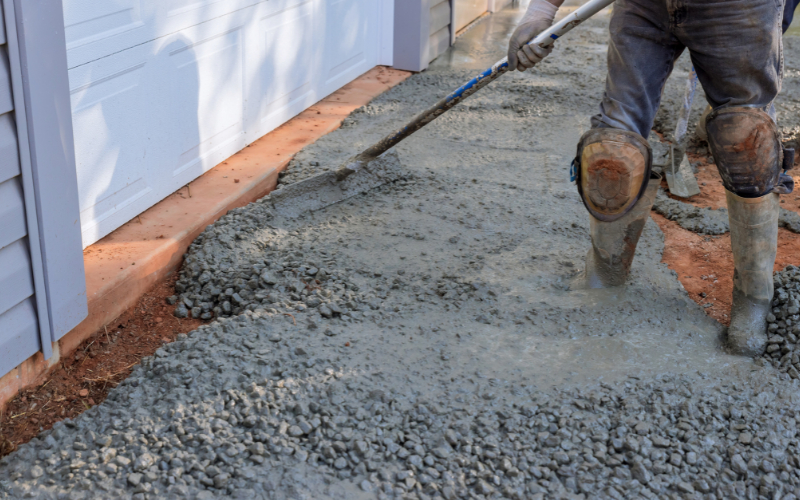
When you invest in new concrete, you want it to last. Concrete driveways, patios, or walkways look great when they’re new, but they can wear out fast without protection. Rain, sunlight, oil, and even foot traffic can slowly damage the surface. That’s where sealants come in. A good sealant forms a protective layer that helps your concrete last longer and stay cleaner.
In this article, we’ll explore what sealants do, the different types available, and which ones are the best for protecting your new concrete surfaces. If you’re in Bellevue, Nebraska, you can always count on Bellevue Concrete Pros for expert advice and quality service. Their team at 4916 Robin Dr, Bellevue, NE 68157 knows how to keep your concrete looking new for years.
Why Concrete Needs Sealant
Concrete is strong, but it’s not perfect. It’s full of tiny pores that let water, salt, oil, and chemicals seep in. Over time, this can cause cracks, fading, and surface damage. When concrete absorbs water, and that water freezes, it expands—this leads to chips and flakes. The freeze-thaw cycle is one of the biggest threats to concrete surfaces, especially in cold areas like Nebraska.
A sealant acts like a shield. It closes those pores and keeps water and other materials out. With a sealant, your concrete resists stains, surface wear, and cracks. It also keeps the color of decorative or stained concrete vibrant for longer.
The Benefits of Using Concrete Sealants
Using a sealant on new concrete gives many long-term benefits:
-
Prevents Water Damage: Sealants stop water from soaking into the surface, reducing cracks and flaking.
-
Resists Stains: Oil, grease, and chemicals can’t easily penetrate sealed concrete.
-
Enhances Appearance: A sealed surface looks clean and sometimes shinier, depending on the type of sealant.
-
Extends Lifespan: A well-sealed concrete surface can last many years longer.
-
Reduces Maintenance: Sealed concrete is easier to clean and less likely to need repair.
Simply put, sealants are an easy investment that saves you money and keeps your property looking great.
Types of Concrete Sealants
Not all sealants are the same. The right one depends on the surface type, weather conditions, and the kind of protection you want. Let’s break down the main types:
1. Penetrating Sealants
Penetrating sealants are absorbed into the concrete. They work below the surface, blocking moisture from getting in. These sealants don’t change how the concrete looks, so they’re ideal if you want a natural finish.
Common penetrating sealants include:
-
Silane Sealers: Great for driveways and outdoor surfaces. They resist salt and water damage.
-
Siloxane Sealers: Best for light protection on walls and sidewalks.
-
Silicate Sealers: Strengthen the surface by reacting with lime in the concrete.
-
Silane/Siloxane Blends: Combine the strengths of both types for balanced protection.
Penetrating sealants are perfect for driveways, parking lots, and sidewalks that face heavy weather or traffic.
2. Acrylic Sealants
Acrylic sealants create a thin, protective film on top of the concrete. They come in both water-based and solvent-based formulas. These sealants can give the surface a shiny, “wet look,” making them popular for decorative patios or colored concrete.
-
Water-Based Acrylics: Eco-friendly and easy to apply.
-
Solvent-Based Acrylics: Provide a richer color enhancement and stronger protection.
Acrylic sealants usually last 1–3 years before needing reapplication, making them a great choice for decorative or indoor surfaces.
3. Epoxy Sealants
Epoxy sealants are known for their strong, glossy finish. They form a thick protective layer that resists chemicals, stains, and abrasion. However, epoxy doesn’t breathe well—if moisture gets trapped underneath, it can cause peeling.
Epoxy sealants are best for indoor areas like garages, basements, or workshops, where water exposure is limited.
4. Polyurethane Sealants
Polyurethane sealants offer excellent durability and UV resistance. They protect against chemicals, oil, and heavy traffic. These are often used for commercial floors, driveways, and outdoor patios.
-
Water-Based Polyurethane: More flexible and resistant to UV damage.
-
Solvent-Based Polyurethane: Stronger and more resistant to wear but can yellow over time.
Polyurethane sealants last longer than acrylics—usually up to 5 years or more.
Choosing the Right Sealant for Your Concrete
To get the best results, you need the right sealant for your specific project. Here’s a quick guide:
| Surface Type | Recommended Sealant | Why It Works Best |
|---|---|---|
| Driveways | Silane or Silane/Siloxane | Great water and salt resistance |
| Patios | Acrylic or Polyurethane | Enhances look and protects from UV |
| Garage Floors | Epoxy | Strong against oil and chemicals |
| Sidewalks | Penetrating Sealers | Keeps natural look and stops moisture |
| Decorative Concrete | Acrylic | Boosts color and gloss |
If you’re unsure, your local concrete contractor can guide you based on the surface, use, and climate in Bellevue.
When to Seal New Concrete
Timing matters when sealing new concrete. Applying a sealant too early can trap moisture inside and cause issues. Most professionals recommend waiting at least 28 days after the concrete is poured. This allows it to fully cure and harden.
However, some “breathable” sealants can be applied sooner—around 7 days after pouring—depending on weather and moisture levels.
You’ll know your concrete is ready for sealing when it’s completely dry and free of moisture spots.
How to Apply Concrete Sealant
Applying a concrete sealant is not difficult, but it must be done right for long-lasting results.
Here’s a simple step-by-step process:
Step 1: Clean the Surface
Remove dirt, grease, and stains using a pressure washer or degreasing cleaner. A clean surface ensures the sealant sticks properly.
Step 2: Let It Dry
Make sure the surface is completely dry before applying the sealant. Even small damp spots can affect how well it bonds.
Step 3: Apply the Sealant
Use a sprayer, roller, or brush. For large areas, a pump-up sprayer is usually fastest. Apply evenly and avoid puddles.
Step 4: Let It Cure
Allow the sealant to dry based on the manufacturer’s instructions—usually 24 hours before walking on it and 48–72 hours before driving.
Step 5: Apply a Second Coat (if needed)
Some sealants need a second coat for added protection, especially acrylics or polyurethanes.
A professional concrete contractor like Bellevue Concrete Pros can ensure the job is done perfectly.
How Often to Reseal Concrete
No sealant lasts forever. Over time, weather and traffic wear it down. How often you reseal depends on the type:
-
Acrylic: Every 1–3 years
-
Epoxy: Every 3–5 years
-
Polyurethane: Every 4–6 years
-
Penetrating Sealers: Every 5–10 years
Inspect your concrete yearly. If you notice dullness, color fading, or water no longer beading up, it’s time for a new coat.
Common Mistakes When Sealing Concrete
Many homeowners make small mistakes that reduce the sealant’s effectiveness. Avoid these:
-
Sealing Too Early: Wait for full curing to avoid trapping moisture.
-
Skipping Cleaning: Dirt and oil prevent sealant from bonding.
-
Over-Applying: Too much sealant can cause bubbles or a cloudy finish.
-
Ignoring Weather: Apply only when the temperature is above 50°F and rain isn’t expected.
-
Not Following Instructions: Each product has different curing and application times.
Getting professional help ensures these issues don’t happen.
The Best Sealant Brands for New Concrete
If you’re looking for reliable products, here are some top-rated sealant brands that perform well in different conditions:
-
Foundation Armor SX5000: Silane-based, ideal for driveways and sidewalks.
-
Ghostshield Siloxa-Tek 8500: Penetrating sealer with long-lasting protection.
-
Tuff Duck Concrete Countertop Sealer: Great for indoor or decorative concrete.
-
Quikrete Acrylic Cure and Seal: Affordable and easy to apply.
-
EnduraSeal 100% Acrylic Sealer: Adds a wet-look finish and UV resistance.
-
Armor AR350: Solvent-based acrylic for a rich gloss.
Always check product labels and choose one that fits your project’s needs.
Why Choose Bellevue Concrete Pros
If you want your concrete to last, professional sealing is key. Bellevue Concrete Pros, based at 4916 Robin Dr, Bellevue, NE 68157, is your local specialist for all concrete services—from installation to sealing.
Their experienced team knows which sealants perform best in Nebraska’s weather. They use industry-grade products and proven application methods to make sure your concrete stays protected for years.
Whether it’s a new driveway, a decorative patio, or a commercial floor, Bellevue Concrete Pros delivers durable, clean, and beautiful results.
If you’re searching for a reliable concrete contractor in Bellevue, these professionals have you covered.
Final Thoughts
Protecting your new concrete with a sealant is one of the smartest decisions you can make. It’s a small step that brings big rewards—better durability, cleaner surfaces, and long-lasting beauty.
The best sealant depends on your needs. Penetrating sealers work best outdoors for strength and longevity. Acrylics and polyurethanes bring shine and UV protection. Epoxies are perfect indoors where durability matters most.
But beyond products, proper application and timing make the real difference. That’s why working with experts like Bellevue Concrete Pros ensures your investment lasts for decades.
Your concrete doesn’t just deserve to look great—it deserves to stay strong, year after year.

